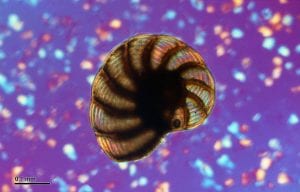Guest Author – Chloe Jones
Palaeobiology MSc Graduate
When I was younger (and trying to figure out what to do with my life), I never thought I’d end up with a career in science, and yet here I am as a research technician at the University of Bristol working on microfossils. Having been guided/supervised/advised by woman in science for the majority of my academic career (big thanks to Prof Daniela Schmidt!), I am proud to be a part of that group and I want to continue to be a part of it. In fact, as I am writing this, I should be preparing for my PhD interview this afternoon… but I needed a distraction from the anxiety!
My A-Levels were a weird miss-match of choices: Art, English Literature, History, Chemistry and Geology. Geology was the only subject that really fulfilled my need to know ‘why’, hence my choice to study it at Cardiff University. It was during my undergrad that I took a real interest in how fossils provide an insight in to the past and how useful they can be for the future. Which takes me on to my time here at the University of Bristol, where I studied the application of foraminifera to paleoclimate and palaeoceanography as part of my MSc: my thesis title being ‘the environmental impacts on foraminiferal calcification during the Pliocene’.
The Pliocene is a time interval that is a good comparative to future predictions: the geography is similar to today, and the average CO2 at 420ppm, with the global average temperature being 2 to 3 ºC warmer. Currently we are at 410ppm and increasing temperatures by 1 ºC every 100 years. With atmospheric carbon dioxide increasing so rapidly, it is important to evaluate the impact on the marine system and the services it provides; largely food and climate regulation.

Why foraminifera? They are a fundamental part of the inorganic carbon cycle. They’re also abundant, have an excellent fossil record and are tiny climate storytellers – they document past climates in their test growth and composition. I’ve spent the last few years generating data that provides general understanding of carbonate production in a warmer, high CO2 world. I honestly think this is an area of Palaeobiology that could have a world-changing effect on the climatic system.
My time researching this topic has also heavily influenced my personal life. I have always cared about the environment and the planet we live on, but recently I have taken more steps towards a zero-waste lifestyle and to reduce my carbon footprint. My friends and family (and everyone on Facebook/Twitter) are probably fed up of hearing me go on about it, but it is vital for us and future generations to have somewhere to live and therefore we need to make conscious decisions as individuals and a population to rectify the damage we have caused.
Chloe Jones graduated from the University of Bristol in 2018 with an MSc in Palaeobiology. After spending a year as a Research Associate in the Earth Sciences department, Chloe began a PhD at the University of Southampton in 2019. (@chloelcjones)
Article edited by Rhys Charles

